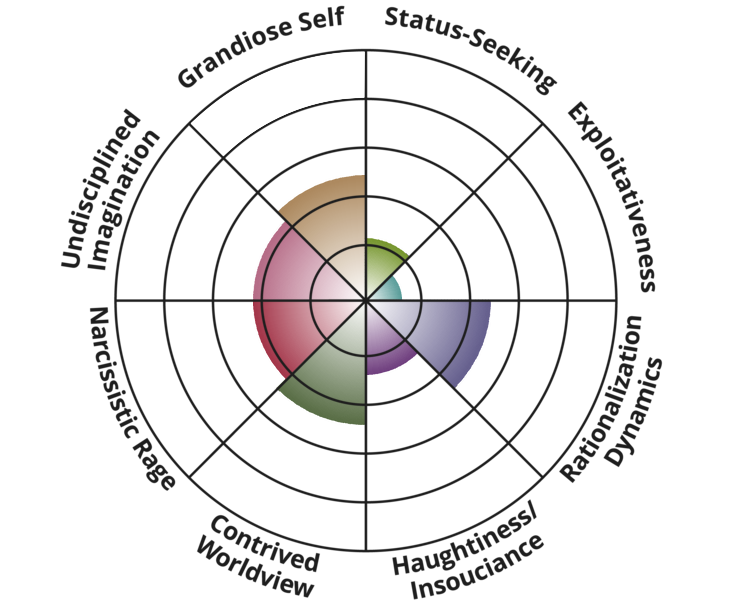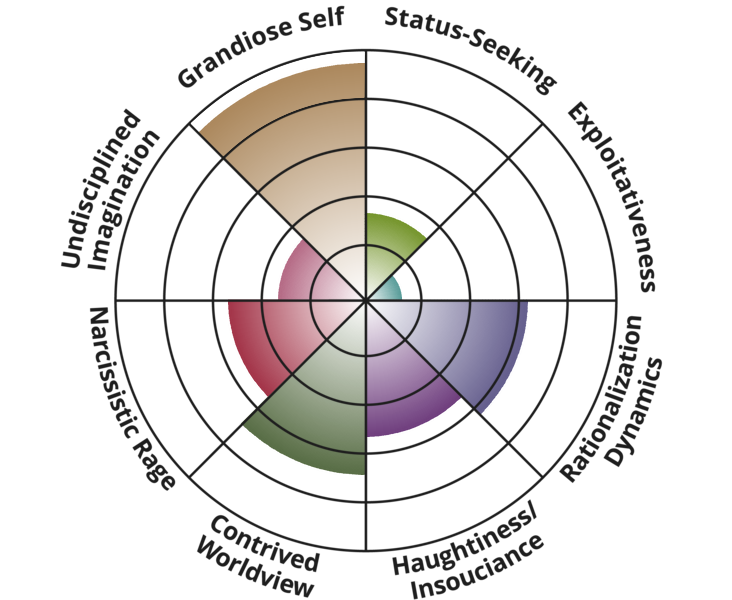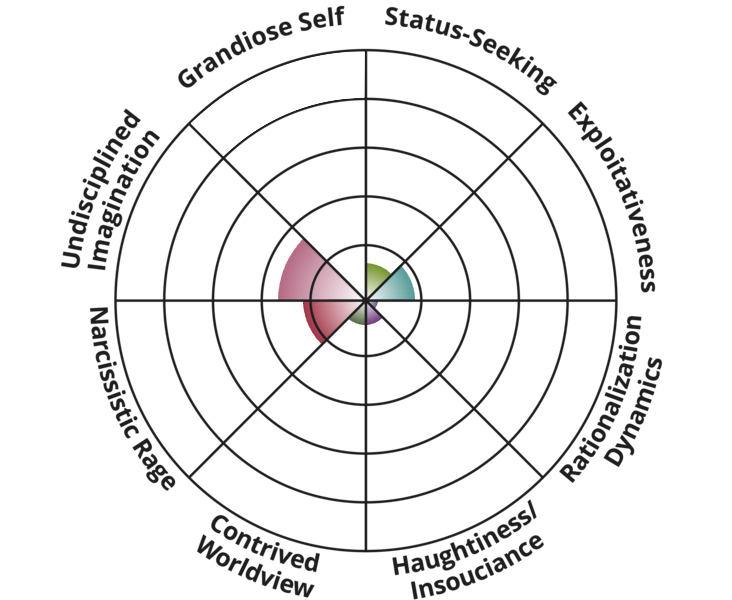yeghor
Well-known member
- Joined
- Dec 21, 2013
- Messages
- 4,272
Narcissism Spectrum Test
Your narcissism is low.

Explanation of Facets:
Your narcissism is low.

Explanation of Facets:
Grandiose Self: People on the narcissism spectrum often have a grandiose sense of entitlement. They tend to overestimate their abilities and importance and exaggerate their accomplishments while downplaying the contributions of others. People high in this symptom often believe that they are special and have an inflated sense of self-importance.
Status Seeking: Individuals with narcissistic tendencies tend to pursue conventional markers of success and achievement that allow them to present themselves as superior and which commonly elicit admiration from others. People high in this symptom are often more concerned with whether they are accorded privilege and status than whether their underlying accomplishments actually make them worthy of such attention.
Exploitativeness: Many people with narcissistic tendencies are perceived by others as interpersonally exploitative; that is, they take others for granted and use others to achieve their own selfish prospects and goals. On the other hand, people with narcissistic elements in their character rarely experience themselves this way since they often experience interpersonal situations through the lens of their own needs.
Rationalization Dynamics: One feature of narcissism is the need to uphold a grandiose or superior self-image, which must be maintained at all times. As a consequence, people on the narcissism spectrum often resort to denial, distortion, and projection in order to rationalize why something bad they did wasn’t their own fault (or was not really a bad thing when viewed in the proper light).
Haughtiness/Insouciance: People on the narcissism spectrum often come across as arrogant, self-satisfied, conceited, and boastful in the eyes of others. And indeed, many narcissists tend to present themselves as self-important and above the rules. But what others often miss is that such facades are often compensatory; that is, defense on the narcissist’s part against being perceived (and perceiving oneself) as a nobody.
Contrived Worldview: Individuals with narcissistic features often have unrealistic conceptions about the world, themselves, and others. One particularly common example is that the rules should not apply to them; other people should be punished when they behave poorly, but not them. Other common examples include the belief that they are at the center of everything others say, do, and think, as well as the notion that their contributions and efforts were better and more important than they really were.
Narcissistic Rage: Narcissistic individuals easily feel slighted and often react with rage when their grandiose self and haughty façade are challenged. Their rage often arises when someone lets the narcissist know that they are not impressed with them; that they are disappointed with them or even that they think the narcissist is a sham. In such situations, the narcissistic person will typically react with ire that is out of proportion to the criticism that was leveled at them, attesting to the fact that many narcissists have difficulty regulating their emotions.
Undisciplined Imagination: Many individuals with narcissistic tendencies live in a fantasy world where major problems and hindrances are brushed aside as if they were nothing; as if merely having thought of completing a project would be enough to achieve it. In the same way, many narcissists readily refashion their memories of the past and dreams of the future to fit with their desires and how they wish to think of and present themselves at any given time.
Status Seeking: Individuals with narcissistic tendencies tend to pursue conventional markers of success and achievement that allow them to present themselves as superior and which commonly elicit admiration from others. People high in this symptom are often more concerned with whether they are accorded privilege and status than whether their underlying accomplishments actually make them worthy of such attention.
Exploitativeness: Many people with narcissistic tendencies are perceived by others as interpersonally exploitative; that is, they take others for granted and use others to achieve their own selfish prospects and goals. On the other hand, people with narcissistic elements in their character rarely experience themselves this way since they often experience interpersonal situations through the lens of their own needs.
Rationalization Dynamics: One feature of narcissism is the need to uphold a grandiose or superior self-image, which must be maintained at all times. As a consequence, people on the narcissism spectrum often resort to denial, distortion, and projection in order to rationalize why something bad they did wasn’t their own fault (or was not really a bad thing when viewed in the proper light).
Haughtiness/Insouciance: People on the narcissism spectrum often come across as arrogant, self-satisfied, conceited, and boastful in the eyes of others. And indeed, many narcissists tend to present themselves as self-important and above the rules. But what others often miss is that such facades are often compensatory; that is, defense on the narcissist’s part against being perceived (and perceiving oneself) as a nobody.
Contrived Worldview: Individuals with narcissistic features often have unrealistic conceptions about the world, themselves, and others. One particularly common example is that the rules should not apply to them; other people should be punished when they behave poorly, but not them. Other common examples include the belief that they are at the center of everything others say, do, and think, as well as the notion that their contributions and efforts were better and more important than they really were.
Narcissistic Rage: Narcissistic individuals easily feel slighted and often react with rage when their grandiose self and haughty façade are challenged. Their rage often arises when someone lets the narcissist know that they are not impressed with them; that they are disappointed with them or even that they think the narcissist is a sham. In such situations, the narcissistic person will typically react with ire that is out of proportion to the criticism that was leveled at them, attesting to the fact that many narcissists have difficulty regulating their emotions.
Undisciplined Imagination: Many individuals with narcissistic tendencies live in a fantasy world where major problems and hindrances are brushed aside as if they were nothing; as if merely having thought of completing a project would be enough to achieve it. In the same way, many narcissists readily refashion their memories of the past and dreams of the future to fit with their desires and how they wish to think of and present themselves at any given time.






